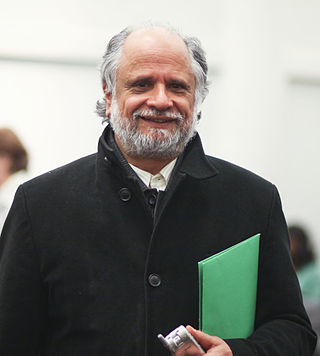Related Research Articles
Stanley Eugene Fish is an American literary theorist, legal scholar, author and public intellectual. He is currently the Floersheimer Distinguished Visiting Professor of Law at Yeshiva University's Benjamin N. Cardozo School of Law in New York City. Fish has previously served as the Davidson-Kahn Distinguished University Professor of Humanities and a professor of law at Florida International University and is dean emeritus of the College of Liberal Arts and Sciences at the University of Illinois at Chicago.
Lauren Gail Berlant was an American scholar, cultural theorist, and author who is regarded as "one of the most esteemed and influential literary and cultural critics in the United States." Berlant was the George M. Pullman Distinguished Service Professor of English at the University of Chicago, where they taught from 1984 until 2021. Berlant wrote and taught issues of intimacy and belonging in popular culture, in relation to the history and fantasy of citizenship.

Homi Kharshedji Bhabha is an Indian scholar and critical theorist. He is the Anne F. Rothenberg Professor of the Humanities at Harvard University. He is one of the most important figures in contemporary postcolonial studies, and has developed a number of the field's neologisms and key concepts, such as hybridity, mimicry, difference, and ambivalence. Such terms describe ways in which colonised people have resisted the power of the coloniser, according to Bhabha's theory. In 2012, he received the Padma Bhushan award in the field of literature and education from the Indian government. He is married to attorney and Harvard lecturer Jacqueline Bhabha, and they have three children.

Dipesh Chakrabarty is an Indian historian and leading scholar of postcolonial theory and subaltern studies. He is the Lawrence A. Kimpton Distinguished Service Professor in history at the University of Chicago, and is the recipient of the 2014 Toynbee Prize, named after Professor Arnold J. Toynbee, that recognizes social scientists for significant academic and public contributions to humanity. He is the author of the seminal Provincializing Europe: Postcolonial Thought and Historical Difference (2000).
Thing theory is a branch of critical theory that focuses on human–object interactions in literature and culture. It borrows from Heidegger's distinction between objects and things, which posits that an object becomes a thing when it can no longer serve its common function. The Thing in Thing Theory is conceptually like Jacques Lacan's Real; Felluga states that it is influenced by Actor-network theory and the work of Bruno Latour.
William John Thomas Mitchell is an American academic. Mitchell is the Gaylord Donnelley Distinguished Service Professor of English and Art History at the University of Chicago. He was the editor of Critical Inquiry for 42 years, from 1978 to 2020, and also contributes to the journal October.

Critical Inquiry is a quarterly peer-reviewed academic journal in the humanities published by the University of Chicago Press on behalf of the Department of English Language and Literature. While the topics and historical periods it covers are diverse, the journal is known as a long-standing, highly regarded critical theory driven venue for interpretive scholarship, especially but not exclusively in literature and textual criticism. It was established in 1974 by Wayne Booth, Arthur Heiserman, and Sheldon Sacks. From 1978 to 2020, the journal was edited by W. J. T. Mitchell. Since June 2020 it is co-edited by Bill Brown and Frances Ferguson.

David Martin Bevington was an American literary scholar. He was the Phyllis Fay Horton Distinguished Service Professor Emeritus in the Humanities and in English Language & Literature, Comparative Literature, and the college at the University of Chicago, where he taught since 1967, as well as chair of Theatre and Performance Studies. "One of the most learned and devoted of Shakespeareans," so called by Harold Bloom, he specialized in British drama of the Renaissance, and edited and introduced the complete works of William Shakespeare in both the 29-volume, Bantam Classics paperback editions and the single-volume Longman edition. After accomplishing this feat, Bevington was often cited as the only living scholar to have personally edited Shakespeare's complete corpus.
Dick Hebdige is an English media theorist and sociologist, and a professor emeritus of art and media studies at the University of California, Santa Barbara, where he taught from 2004 to 2021. His work is commonly associated with the study of subcultures, and its resistance against the mainstream of society. His current research interests include media topographies, desert studies, and performative criticism.
Albert Borgmann was a German-born American philosopher, specializing in the philosophy of technology.
Peter Preston Brooks is an American literary theorist who is Sterling Professor Emeritus of Comparative Literature at Yale University and Andrew W. Mellon Scholar in the Department of Comparative Literature and the Center for Human Values at Princeton University. He has been Professor in the Department of English and School of Law at the University of Virginia. Among his many accomplishments is the founding of the Whitney Humanities Center at Yale University. He was elected to the American Philosophical Society in 2003. Brooks is an interdisciplinary scholar whose work cuts across French and English literature, law, and psychoanalysis. He was influenced by fellow Yale scholar, Paul de Man, to whom his book Reading for the Plot is dedicated. His 2022 book Seduced By Story was a finalist for the 2023 National Book Critics Circle award in criticism.
Françoise Meltzer is a professor of Philosophy of Religion at the University of Chicago Divinity School. She is the Chair of Comparative Literature at the University of Chicago.

Lorraine Jenifer Daston is an American historian of science. She is director emerita of the Max Planck Institute for the History of Science (MPIWG) in Berlin, visiting professor in the Committee on Social Thought at the University of Chicago, and an authority on early modern Europe's scientific and intellectual history. In 1993, she was named a fellow of the American Academy of Arts and Sciences. She is a permanent fellow at the Berlin Institute for Advanced Study.

Jay Clayton is an American literary critic who is known for his work on the relationship between nineteenth-century culture and postmodernism. He has published influential works on Romanticism and the novel, Neo-Victorian literature, steampunk, hypertext fiction, online games, contemporary American fiction, technology in literature, and genetics in literature and film. He is the William R. Kenan, Jr. Professor of English and director of the Curb Center for Art, Enterprise, and Public Policy at Vanderbilt University.
Rita Felski is an academic and critic, who holds the John Stewart Bryan Professorship of English at the University of Virginia and is a former editor of New Literary History. She is also Niels Bohr Professor at the University of Southern Denmark (2016–2021).
The William Riley Parker Prize is the oldest award given by the Modern Language Association, the principal professional organization in the United States and Canada for scholars of language and literature. The Parker Prize is awarded each year for an “outstanding article” published in PMLA—the association's primary journal, and widely considered the most prestigious in the study of modern languages and literatures. It was first awarded in 1964 to David J. DeLaura, then a professor at the University of Texas at Austin, for his article, “Arnold and Carlyle,” which had been published in the March 1964 issue of PMLA.

Imre Szeman is a Canadian cultural theorist, professor, and public intellectual. He is Director of the Institute for Environment, Conservation, and Sustainability and Professor of Human Geography at the University of Toronto Scarborough. Szeman was previously University Research Chair of Environmental Communication at the University of Waterloo (2017–2022), Canada Research Chair of Cultural Studies at the University of Alberta (2009–2016), and Senator William McMaster Chair in Globalization and Cultural Studies at McMaster University. In 2020, Szeman was named as a Fellow of the Royal Society of Canada. In 2022, he was the Leverhulme Visiting professor in Critical Studies at the University of Glasgow. From 2021 to 2022, Szeman served as the Climate Critic for the Green Party of Canada. In 2024, he became the Green Party's Critic for Electoral Reform.
In literary criticism and cultural studies, postcritique is the attempt to find new forms of reading and interpretation that go beyond the methods of critique, critical theory, and ideological criticism. Such methods have been characterized as a "hermeneutics of suspicion" by Paul Ricœur and as a "paranoid" or suspicious style of reading by Eve Kosofsky Sedgwick. Proponents of postcritique argue that the interpretive practices associated with these ways of reading are now unlikely to yield useful or even interesting results. As Rita Felski and Elizabeth S. Anker put it in the introduction to Critique and Postcritique, "the intellectual or political payoff of interrogating, demystifying, and defamiliarizing is no longer quite so self-evident." A postcritical reading of a literary text might instead emphasize emotion or affect, or describe various other phenomenological or aesthetic dimensions of the reader's experience. At other times, it might focus on issues of reception, explore philosophical insights gleaned via the process of reading, pose formalist questions of the text, or seek to resolve a "sense of confusion."
Susan Laura Mizruchi is professor of English literature and the William Arrowsmith Professor in the Humanities at Boston University. Her research interests include nineteenth- and twentieth-century American literature, religion and culture, literary and social theory, literary history, history of the social sciences, and American and Global Film and TV. Since 2016, she has served as the director of the Boston University Center for the Humanities.
Jason Merchant is the Lorna Puttkammer Straus Distinguished Service Professor of Linguistics and Vice Provost for Academic Appointments and Graduate Education at the University of Chicago, as well as Faculty Director of UChicagoGRAD.
References
- ↑ "Dean Announces Two New Deputy Dean Positions | News from the Division of the Humanities". 6 June 2012.
- ↑ "William Riley Parker Prize Winners". Archived from the original on 2008-12-09. Retrieved 2009-06-04.
- ↑ "Bill Brown | Modern Thought & Literature". Archived from the original on 2014-02-02.
- ↑ "Bill Brown". Archived from the original on 2005-04-10. Retrieved 2005-04-02.